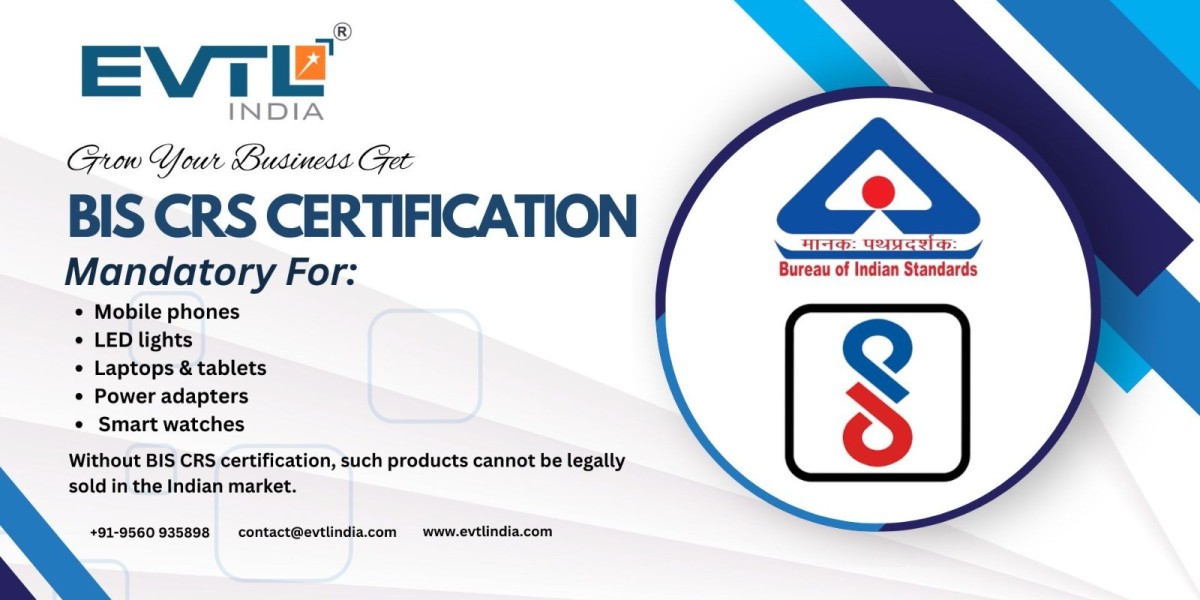In today’s digital economy, electronic and IT products dominate every household, office, and industrial setup. With this growing dependence, ensuring consumer safety and product reliability has become a national priority. To regulate quality standards and safeguard users, the Bureau of Indian Standards (BIS) introduced the Compulsory Registration Scheme (CRS).
Manufacturers of electronic and IT products must obtain BIS CRS Certification before selling or importing their products in India. This certification ensures that goods conform to prescribed Indian safety standards, thereby building trust with customers and preventing substandard products from entering the market.
This blog provides a detailed overview of BIS CRS, BIS CRS Registration, BIS CRS Certification, and CRS Certification, covering its scope, process, and significance for stakeholders.
What is BIS CRS?
The BIS CRS was launched in 2012 by the Ministry of Electronics and Information Technology (MeitY) in collaboration with BIS. Initially, it covered 15 electronic products such as laptops, tablets, and LED lamps. Over time, the scope has expanded to include more than 80 categories of electronics and IT goods, ensuring consumer safety across a wide spectrum.
Under CRS, every product must be tested in a BIS-recognized laboratory and registered with BIS before it can be manufactured, sold, or imported in India.
Importance of BIS CRS Certification
- Consumer Safety – Protects users from hazards like electric shock, fire, or radiation.
- Market Compliance – Ensures adherence to Indian safety standards, avoiding legal issues.
- Brand Credibility – Enhances consumer trust and boosts product acceptance in a competitive market.
- Import Regulation – Restricts foreign manufacturers from exporting low-quality goods into India.
- Government Recognition – Products with BIS CRS Registration can carry the standard BIS mark, symbolizing reliability.
Products Covered Under BIS CRS
BIS CRS Certification applies to a wide range of electronic and IT products. Some major categories include:
- Laptops, tablets, and desktop computers
- Printers, scanners, and plotters
- LED lamps and lighting products
- Smart TVs, set-top boxes, and monitors
- Power adapters, chargers, and UPS systems
- USB storage devices and memory cards
The government frequently updates the product list, and non-compliance can result in penalties, product seizure, or business restrictions.
BIS CRS Registration Process
Obtaining BIS CRS Registration involves multiple steps, ensuring that only tested and compliant products enter the Indian market.
Identify Applicability
- Determine whether your product is listed under the compulsory CRS category.
Product Testing
- Submit product samples to a BIS-recognized laboratory for testing against Indian standards (IS).
Application Submission
- File the application on the BIS portal along with required documents such as factory license, test reports, and technical details.
Document Verification
- BIS reviews the submitted application, ensuring accuracy and compliance with prescribed norms.
Grant of Registration
- Once approved, BIS issues the CRS Certification, and manufacturers can affix the BIS Standard Mark with the unique R-number on their products.
Documents Required for BIS CRS Registration
To streamline CRS certification, applicants must prepare a proper documentation set, including:
- Business license or company incorporation certificate
- Manufacturing unit details
- Authorized signatory information
- Product test reports from BIS-approved labs
- Factory layout and manufacturing process details
- Letter of authorization (for foreign manufacturers via Authorized Indian Representative)
Role of Authorized Indian Representative (AIR)
For foreign manufacturers, BIS mandates the appointment of an Authorized Indian Representative (AIR). The AIR acts as a local contact point, responsible for compliance and coordination with BIS during and after the certification process. Without an AIR, foreign companies cannot apply for CRS Certification.
Validity and Renewal of BIS CRS
- Validity: CRS Certification is valid for two years from the date of issue.
- Renewal: Manufacturers can renew the certificate by submitting updated documents and ensuring continued product compliance.
- Continuous Surveillance: BIS may conduct audits or request product re-testing to ensure ongoing conformity.
Benefits of BIS CRS Registration
- Legal Compliance: Avoids penalties and restrictions.
- Consumer Trust: Customers prefer certified products.
- Market Expansion: CRS-certified products gain wider acceptance in India.
- Competitive Edge: Sets your brand apart from uncertified competitors.
- Government Support: CRS aligns with India’s goal of promoting quality-driven, consumer-safe electronics.
Challenges in BIS CRS Certification
While BIS CRS Registration is crucial, businesses often face challenges like:
- Navigating complex documentation
- Time-consuming product testing and approval
- Understanding frequent regulatory updates
- Higher costs for multiple product models
Engaging a BIS CRS consultant can simplify the process, ensuring timely registration and avoiding costly mistakes.
Conclusion
EVTL India is one of the leading BIS Consultant in India, helping manufacturers obtain their BIS licences hassle-free. In a rapidly evolving electronic and IT industry, BIS CRS Certification plays a pivotal role in ensuring product safety, quality, and compliance with Indian standards. Both domestic and foreign manufacturers must obtain BIS CRS Registration before launching products in India.
The certification not only safeguards consumer interest but also builds trust, enhances brand reputation, and ensures market competitiveness. With CRS becoming a cornerstone of India’s quality compliance ecosystem, manufacturers who prioritize timely certification will enjoy long-term success in one of the world’s fastest-growing markets.
Whether you are a local business or a global manufacturer targeting India, obtaining CRS Certification is not just a regulatory formality—it is an investment in credibility, safety, and growth.






